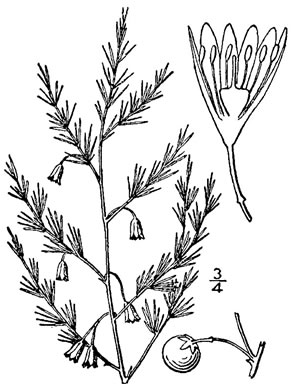Hovering over an image will enlarge it and point out features (works better on desktop than on mobile).
![]() A camera indicates there are pictures.
A camera indicates there are pictures.
![]() A speaker indicates that a botanical name is pronounced.
A speaker indicates that a botanical name is pronounced.
![]() A plus sign after a Latin name indicates that the species is further divided into varieties or subspecies.
A plus sign after a Latin name indicates that the species is further divided into varieties or subspecies.
Most habitat and range descriptions were obtained from Weakley's Flora.
Your search found 2 taxa in the family Asparagaceae, Asparagus family, as understood by Weakley's Flora.

![]() Common Name:
Garden Asparagus, Sparrowgrass
Common Name:
Garden Asparagus, Sparrowgrass
Weakley's Flora: (4/24/22) Asparagus officinalis FAMILY: Asparagaceae
SYNONYMOUS WITH PLANTS National Database: Asparagus officinalis FAMILY: Liliaceae
SYNONYMOUS WITH Vascular Flora of the Carolinas (Radford, Ahles, & Bell, 1968): Asparagus officinalis 041-01-001 FAMILY: Liliaceae
Habitat: Commonly cultivated, commonly escaped to fencerows, roadsides, disturbed areas
Common (uncommon in GA Coastal Plain)
Non-native: Eurasia

![]() Common Name:
Sprenger’s Asparagus-fern, Emerald-fern
Common Name:
Sprenger’s Asparagus-fern, Emerald-fern
Weakley's Flora: (4/24/22) Asparagus aethiopicus FAMILY: Asparagaceae
SYNONYMOUS WITH PLANTS National Database: Asparagus aethiopicus FAMILY: Liliaceae
Habitat: Disturbed areas, seeding down especially around plantings, especially commonly planted in coastal areas; sometimes epiphytic in palm boots
Rare
Non-native: southern Africa
Your search found 2 taxa. You are on page PAGE 1 out of 1 pages.










